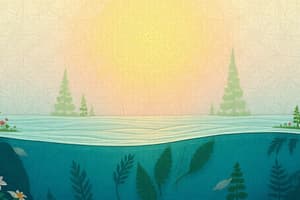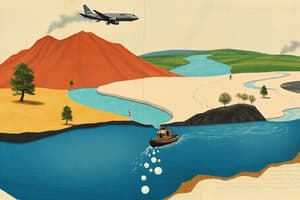Podcast
Questions and Answers
What is the primary impact of urbanization on the water cycle?
What is the primary impact of urbanization on the water cycle?
Which of the following is a cause of salinization?
Which of the following is a cause of salinization?
Which category does thermal pollution belong to?
Which category does thermal pollution belong to?
What does BOD measure in water bodies?
What does BOD measure in water bodies?
Signup and view all the answers
What is non-point source pollution?
What is non-point source pollution?
Signup and view all the answers
Which of the following would likely reduce the groundwater recharge?
Which of the following would likely reduce the groundwater recharge?
Signup and view all the answers
What is the process of nitrification?
What is the process of nitrification?
Signup and view all the answers
What formula is used to estimate the downstream concentration after a snow dump site meltwater runoff?
What formula is used to estimate the downstream concentration after a snow dump site meltwater runoff?
Signup and view all the answers
Study Notes
Global Hydrologic Cycle
- Describes the continuous movement of water on, above, and below Earth's surface
- Involves evaporation, condensation, precipitation, infiltration, and runoff
Canadian Watersheds
- Pacific Ocean
- Arctic Ocean
- Hudson Bay
- Atlantic Ocean
- Gulf of Mexico
Urbanization Impact on Water Cycle
- Increases runoff due to impermeable surfaces (e.g., asphalt)
- Reduces groundwater recharge
- Pollutes waterways with urban contaminants
- Alters hydrology and reduces wetland areas
Salinization
- Accumulation of salts in soil, reducing fertility
- Caused by irrigation in arid regions (water evaporation leaves behind salts)
- Poor drainage leading to waterlogging
- Overuse of saline groundwater
Main Water Pollution Categories
- Sediment pollution
- Nutrient pollution
- Organic pollution
- Pathogens
- Thermal pollution
- Radioactive substances
- Heavy metals
- Oil spills
Biochemical Oxygen Demand (BOD)
- Measures oxygen needed by microorganisms to break down organic matter in water
- High BOD levels indicate pollution, reducing oxygen availability for aquatic life
Nitrification and Denitrification
- Nitrification: Ammonia converted into nitrites and nitrates by bacteria (consuming oxygen)
- Denitrification: Nitrates converted into nitrogen gas by bacteria under anaerobic conditions
Point and Non-Point Source Pollution
- Non-point source: Diffuse pollution over a large area (e.g., agricultural runoff)
- Point source: Pollution from a specific source (e.g., factory discharge)
Estimating Snow Dump Site Meltwater Runoff Impact
- Steps: Identify contaminant concentration & flow rates for river & dump site
- Use the formula: [ (Criver * Qriver) + (Cdump * Qdump)] / (Qriver + Qdump)
- Downstream concentration calculation
Aquifers
- Confined aquifers: Enclosed by impermeable layers, recharged remotely
- Unconfined aquifers: Directly connected to the surface, recharged locally
Major Water-Consuming Sectors (Globally)
- Agriculture (70%)
- Industry (20%)
- Domestic use (10%)
Drinking Water Treatment
- Coagulation & flocculation
- Sedimentation
- Filtration
- Disinfection (e.g., chlorination or UV)
Domestic Wastewater Treatment
- Primary treatment: Physical debris removal
- Secondary treatment: Decomposition of organics by bacteria
- Advanced treatment: Nutrient removal
- Sludge management
Ocean Environmental Challenges
- Plastic pollution (improper waste disposal)
- Overfishing (unsustainable practices)
- Oil spills (transportation & drilling accidents)
- Climate change (Greenhouse gas emissions causing acidification & rising sea levels)
- Dead zones (Nutrient runoff causing eutrophication)
Studying That Suits You
Use AI to generate personalized quizzes and flashcards to suit your learning preferences.
Related Documents
Description
Explore the fundamental concepts of the global hydrologic cycle, including the processes of evaporation, condensation, and runoff. Learn about the impact of urbanization on water systems, salinization issues, and various categories of water pollution. This quiz will test your knowledge on these critical environmental topics.




